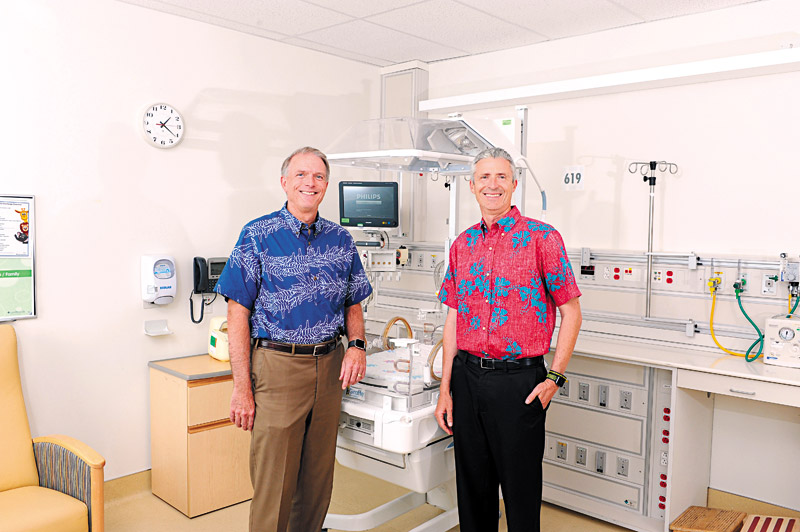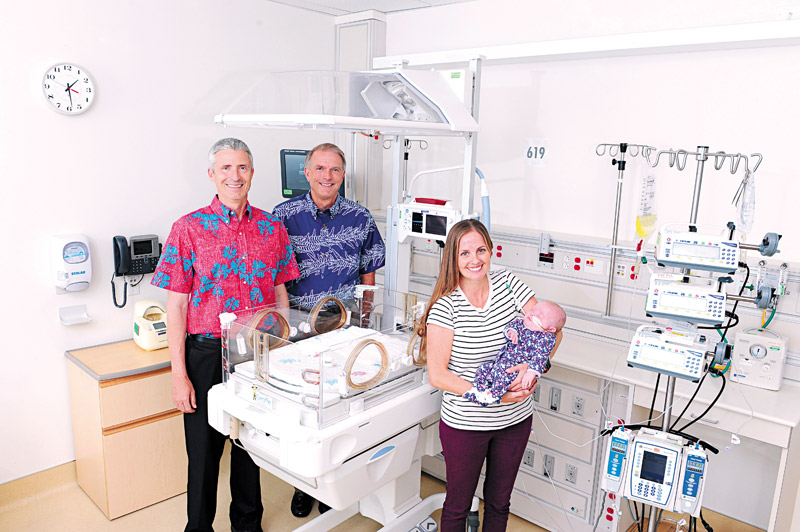The Continuum Of Care

Dave Underriner, president of Kaiser Foundation Health Plan & Hospitals, Hawai‘i Region, and Dr. Geoff Sewell, president and executive medical director of Hawai‘i Permanente Medical Group
For 60 years, Kaiser Permanente Hawai‘i has been providing first-rate health care to its patients. Fittingly, it will be honored with the Franklin Delano Roosevelt Award for Distinguished Community Service at March of Dimes Hawai‘i’s upcoming 80th anniversary gala.
Brahms’ Lullaby fills the halls of Kaiser Permanente Moanalua Medical Center, prompting staff and patients to pause amid the hustle and bustle of the busy hospital. It lets everyone within the facility’s walls know that a baby has been born, and it’s quite a humbling experience.
“You’ll hear it on average about seven times a day,” explains Dr. Geoff Sewell, president and executive medical director of Hawai‘i Permanente Medical Group. “We just take a break and appreciate so many things about life.”
As Kaiser Permanente Hawai‘i celebrates its 60th year in the islands, that reverence for life and a desire to keep Hawai‘i‘s people healthy remains the same.
November is Prematurity Awareness Month (Nov. 17 is World Prematurity Day), and March of Dimes Hawai‘i invites the public to share images of strong babies by tagging @marchofdimes on Instagram and using the hashtag #worldprematurityday.
To do this, Kaiser Permanente Hawai‘i relies on its unique business model that marries health plan, hospitals and medical group – an archetype not easily mimicked.
It’s a relationship that sees a trifecta of organizations come together for the betterment of patients and members. Kaiser Foundation Health Plan & Hospitals, Hawai‘i Region – headed by president Dave Underriner – works with Hawai‘i Permanente Medical Group under Sewell’s leadership, creating a sort of checks-and-balances parallel between the health plan and care delivery, which is led by the medical group.
While that might sound complicated, the reason for its implementation is simple – it allows Kaiser Permanente to integrate care for a person’s entire lifetime.
“It’s that whole continuum of care,” Underriner adds. “A lot of systems try to understand how we do this, but we don’t have to try and understand. We just do. This dual accountability and collaboration puts patients and their families first, and that’s the bottom line.”

Dr. Geoff Sewell, Dave Underriner and Kelly and Paisley Coleman
For those who have congestive heart failure, for example, Kaiser Permamente’s protocol allows for seamless collaboration between primary care doctors and cardiologists on the best care pathway for the patients.
“To me, that’s the beauty of the integrated system,” he says. “We’re a multidisciplinary group, and our goal is to (figure out) how to care for people for their lifetime.”
Nowhere is this continuum of care more evident than in Kaiser Permanente Hawai‘i’s NICU. The facility is one of three NICUs in the state, where new parents can receive assistance starting with the planning stages, and ending with birth and follow-up care.
“We look at the whole experience,” says Sewell. “We can help you figure out what your prenatal care pathway will look like, we can help you choose a pediatrician, learn the benefits of a concierge pediatrician, we’re here when you deliver, and after we make sure that you have a pediatrician.”
Through this methodology, for example, obstetrician-gynecologists work closely with pediatricians and specialists like midwives, doulas, nutritionists, maternal-fetal medicine specialists, pediatric neurologists, geneticists, pediatric cardiologists and more are available at a moment’s notice.
“We basically have a whole host of specialists behind the scenes that you’re probably never going to need to see, but should you need to see them, they’re there,” Sewell explains.
Another notable aspect of Kaiser Permanente Hawai‘i’s continuum of care is its mother-newborn program, which was established last year. Within one or two days after delivering, a physician goes in to check in with the parents and baby.
“We’ve picked up on issues like Mom being depressed or struggling with breastfeeding,” recalls Sewell. “Let’s say you’re a new mom or dad, you don’t know what’s going on, and the doctor sends you home and says, ‘We’ll see you in two or three weeks.’
“When you get home, you might have 27 questions, but we see you in a day or two, and we can answer all 27 of your questions right then and there.”
In celebration of its 60th anniversary, Kaiser Permanente Hawai‘i invites individuals to share how they stay active in mind, body and spirit. Post photos using the hashtag #thrivewithaloha or submit your photo online at thrivewithaloha.com.
There’s no doubt that Kaiser Permanente Hawai‘i has made great strides in medicinal innovation and patient care. The proof is in its growing membership and substantial medical group base (it boasts more than 600 physicians in more than 120 specialties, the most in the state). But most of all, the evidence is clear in patient and community feedback – Kaiser Permanente Hawai‘i will be honored with the Franklin Delano Roosevelt Award for Distinguished Community Service at the March of Dimes Hawai‘i’s annual gala for its work in promoting the well-being of kama‘āina. (See story on page 30.)
Community service, though, is nothing new for Kaiser Permanente Hawai‘i and its employees, and to celebrate its 60th year in the state, it’s holding a philanthropic promotion that will benefit six local nonprofits.
“Our employees volunteer not only through the programs we offer and community workdays, but they are also out there volunteering on their own,” says Sewell. “We have accepted nominations for employees who are doing great work with nonprofits in the community, and we’ll be selecting six – one per month over the next six months – and then making a $10,000 donation on their behalf to the nonprofit that they serve.”
That spirit of giving and Kaiser’s forward-thinking philosophy on health care is what drew Underriner to his current position earlier this year.
“We have such great potential as we look at how we evolve care and service,” he says. “The reason I came is because of the model of Kaiser Permanente. When I look at the level of expertise we have in the organization, with that continuum of clinical excellence, we can look at how we can better serve the broader community going forward.”
Kudos, Kaiser
For its efforts in supporting people, policies and places, Kaiser Permanente Hawai‘i will be honored with the Franklin Delano Roosevelt Award for Distinguished Community Service at March of Dimes Hawai‘i’s 80th anniversary gala, slated for Nov. 16 at ‘Alohilani Resort Waikīkī Beach.
“They are good stewards of our community,” says Carmella Hernandez, executive director of March of Dimes Hawai‘i. “Kaiser Permanente has supported us for many years.”
Indeed, Kaiser and its employees have been big backers of the nonprofit’s mission to fight for the health of moms and babies in the state. In addition to supporting March of Dimes’ annual ball, the medical group/health plan enterprise also puts together teams for March for Babies (led by Dr. Lois Chiu, chief of neonatology) and the Tadd Fujikawa Invitational Golf Tournament.
“March of Dimes is such a great organization,” says Dave Underriner, president of Kaiser Foundation Health Plan & Hospitals, Hawai‘i Region. “They have a great history of engaging the community, providers and delivery systems, and looking at how we deliver care and support for women and babies. It’s very fortuitous for us to be recognized because we have such a focus on women and children within Kaiser Permanente Hawai‘i.”
For more information on the upcoming gala, visit marchofdimes.org/events/modhigala or call 973-2155.
Keiki Passenger Safety
Putting in a car seat isn’t as straightforward as one would think. How tight do you have to cinch the seatbelt? Does the angle really matter? Do you need to anchor?
One of Kaiser Permamente Hawai‘i’s most popular offerings is its Keiki Passenger Safety program. Pediatrician Dr. Robyn Hasegawa takes the lead, and helps parents and guardians install car or booster seats for their little ones – all free of charge.
“You’d be surprised how many people don’t put in the car seat correctly,” says Dr. Geoff Sewell, president and executive medical director of Hawai‘i Permanente Medical Group. “More than half the time the seat is not put in correctly.”
Call 432-2260 for more information and to register for the next event.






